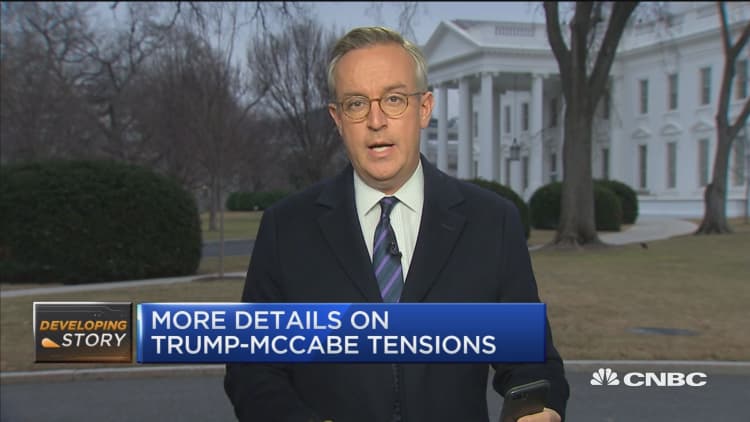Former FBI Deputy Director Andrew McCabe filed a lawsuit against the Department of Justice on Thursday over his 2018 firing, which came just over 24 hours before he planned to retire, alleging the punishment was "politically motivated and retaliatory."
The suit was filed in the U.S. District Court in Washington. It names Attorney General William Barr and FBI Director Christopher Wray, as well as the DOJ and FBI, as defendants. It comes the same week that another longtime FBI official who was fired from the bureau, Peter Strzok, brought suit alleging unlawful termination.
McCabe, who served in the FBI for more than two decades, alleged that President Donald Trump schemed to "discredit and remove DOJ and FBI employees who were deemed to be his partisan opponents because they were not politically loyal to him."
McCabe's public firing by then-Attorney General Jeff Sessions on March 16, 2018 was a "critical element" of the scheme, according to the suit. It says that the reason given for his firing — that he violated the law and FBI media rules by disclosing information related to an investigation into Hillary Clinton — was a pretext.

"In truth and in fact, the sole decision-maker concerning Plaintiff's termination was Trump, whose decision was made and finalized before Defendants ever commenced their pretextual termination process," the suit says.
The suit alleges that McCabe's firing violated the Fifth Amendment's Due Process Clause as well as the First Amendment's protection of speech and association.
McCabe is seeking "any and all relief necessary for him to retire as he had originally planned: as the Deputy Director of the FBI and an agent in good standing, with sufficient time in service to enable him to receive his full earned law enforcement pension, healthcare insurance, and other retirement benefits."
The White House and the Department of Justice declined to comment.
The suit alleges that Trump decided to fire McCabe after deciding during the 2016 presidential election that McCabe was a "partisan enemy," at least partially because his wife, Jill McCabe, received political donations from Clinton ally Terry McAuliffe during a failed bid for a Virginia state Senate seat in 2015.
"In January, February, and March 2017 conversations with then-FBI Director [James] Comey, Trump repeatedly emphasized his perception that [McCabe] was affiliated with Clinton and the Democratic Party, and he repeatedly asked Comey about [McCabe's] personal loyalty to Trump," the suit says.
In February 2017, after McCabe briefed Vice President Mike Pence on counterintelligence matters, McCabe met with Pence, then-White House Counsel Donald McGahn, then-Chief of Staff Reince Priebus and two others in Pence's office. At the meeting, McCabe was "informed that White House officials were questioning [McCabe's] committment to the Trump administration," the suit says.
During a May 2017 meeting with Trump in the Oval Office, the suit says that Trump told McCabe that "FBI personnel loved and supported him, and that at least 80 percent of FBI personnel voted for him."
Trump then asked McCabe whom he voted for in the 2016 election, according to the suit.
"Based on Trump's tone of voice and body language, [McCabe] understood the question as a threat to his employment, notwithstanding his civil service protections, and responded by saying that he 'always played it right down the middle.'" the suit says. "Trump was visibly displeased by [the] answer."
"Because Trump perceived [McCabe] to be affiliated with Clinton and the Democratic Party, and because [McCabe] did not vote for Trump and rebuffed Trump's requests to express partisan support for Trump, Trump decided to have [McCabe] removed from government," the suit alleges.
The suit also alleges that the Justice Department failed to follow "any established agency practices and procedures" for termination proceedings.
It notes that McCabe learned of his termination from media reports.
"Normally, for the termination of FBI employees, a packet of information is prepared with detailed instructions about how a termination must be implemented," the suit says. "To this day, Plaintiff has not received notice of his termination consistent with these policies and procedures."


